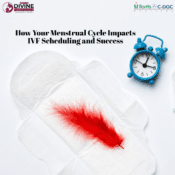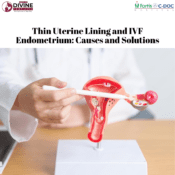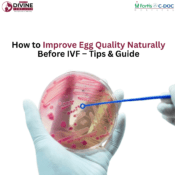

A Step-by-Step Breakdown of the IVF Process from Start to Finish
Introduction
For many couples, the journey to parenthood isn’t always as straightforward as they had hoped. With the development of sophisticated reproductive technology, in vitro fertilization (IVF) has emerged as a ray of hope for those who struggle with infertility, which is more prevalent than you may imagine. Understanding the IVF process step by step can empower aspiring parents to make informed choices and approach their journey with confidence.
Whether you’re considering IVF for the first time or are exploring your fertility options, this guide will take you through the entire IVF process, offering clarity, support, and practical insights.
Brief Overview of IVF (In Vitro Fertilization)
IVF, short for In Vitro Fertilization, is a type of assisted reproductive technology (ART) where eggs are fertilized by sperm outside the body—in a lab—and then transferred to the uterus. IVF bypasses many barriers to conception and has helped millions of couples worldwide conceive healthy babies.
While it’s an incredible medical advancement, the IVF journey can feel overwhelming due to the number of steps, decisions, and emotions involved. That’s why this comprehensive IVF process step by step timeline is crucial.
Importance of Understanding the Full IVF Journey
The IVF journey is more than just a medical procedure—it’s a deeply personal experience. Knowing what to expect at each stage can help manage emotions, timelines, finances, and treatment outcomes. This guide aims to demystify the entire IVF procedure step by step, helping you prepare mentally, emotionally, and physically.
Who This Guide Is For
This guide is tailored for:
- Aspiring parents considering IVF
- First-time IVF patients
- Couples facing unexplained infertility
- Individuals looking for alternative fertility options
It’s also ideal for anyone researching the Best IVF Centre in Delhi, IVF cost in Delhi, or looking for information on advanced IVF techniques.
Step 1: Initial Consultation and Fertility Assessment
Meeting with a Fertility Specialist
Your IVF journey begins with an in-depth consultation at a fertility clinic in Delhi. The specialist will discuss your reproductive history, lifestyle, and any past treatments.
Reviewing Medical History and Lifestyle
You'll be asked about:
- Menstrual cycles
- Sexual health
- Past pregnancies or miscarriages
- Stress levels, smoking, alcohol, and BMI
Fertility Testing for Both Partners
Both partners undergo diagnostic testing:
- Blood tests to evaluate hormones (FSH, LH, AMH)
- Ultrasounds to examine ovarian reserve and uterus
- Semen analysis to evaluate sperm count, motility, and morphology
Setting Expectations and Creating a Personalized Plan
Based on results, your doctor will explain your chances of success, discuss the IVF success rate, and craft a tailored treatment plan. This stage may also address common problems that couples face during IVF treatment.
Step 2: Ovarian Stimulation
Purpose: Stimulate Ovaries to Produce Multiple Eggs
Natural cycles typically produce one egg per month. IVF uses medications to produce several, increasing the chances of successful fertilization.
IVF Medications Used
Stimulation involves injectable hormones such as:
- Gonadotropins (FSH, LH)
- GnRH antagonists to prevent premature ovulation
Monitoring via Blood Tests and Ultrasounds
Frequent visits to your fertility centre in Delhi are necessary to:
- Track hormone levels
- Monitor follicle growth
- Adjust medication dosage
Adjusting Doses Based on Response
Every body reacts differently. Your dose may be adjusted to optimize egg quality and quantity while minimizing risks like Ovarian Hyperstimulation Syndrome (OHSS).
❓ How many injections for IVF treatment?
Typically, 8–14 days of daily injections are required, but this varies.
Step 3: Trigger Shot and Egg Retrieval
Administering the Trigger Shot
When follicles reach ideal size, you’ll receive a trigger shot (hCG or Lupron) to mature the eggs.
Timing the Egg Retrieval
The retrieval happens 34–36 hours post-trigger shot. Timing is critical to collect mature eggs before ovulation.
What Happens During Egg Retrieval
- Performed under sedation
- Ultrasound-guided needle aspiration extracts eggs from follicles
- Procedure takes about 20–30 minutes
Recovery and Next Steps
After retrieval, rest is recommended. The eggs are handed over to the embryology lab for fertilization.
Step 4: Sperm Collection and Preparation
Sperm Collection
- The male partner provides a sample on the same day
- Donor sperm may be used if necessary
Sperm Washing and Preparation
Sperm is processed to isolate the healthiest and most motile ones.
Use of ICSI if Needed
Intracytoplasmic Sperm Injection (ICSI) is used if sperm quality is low—one sperm is directly injected into each egg.
Step 5: Fertilization and Embryo Development
Fertilization Process
Fertilization occurs via:
- Conventional IVF: Mixing eggs and sperm in a dish
- ICSI: Direct injection
Embryo Culture and Monitoring
Fertilized eggs (zygotes) are cultured in the lab for 3–5 days.
Embryo Grading and Selection
Embryologists assess embryos for:
- Cell division rate
- Appearance
- Viability
Potential Use of Preimplantation Genetic Testing (PGT)
PGT can identify genetic issues before implantation, helping to reduce miscarriage risk or genetic diseases.
Step 6: Embryo Transfer
Choosing the Best-Quality Embryo(s)
One or more healthy embryos are selected for transfer, based on grading and PGT results.
The Transfer Procedure
- Quick, painless, and done without anesthesia
- Embryo is inserted via a catheter into the uterus
- Similar to a pap smear
Fresh vs. Frozen Embryo Transfer (FET)
- Fresh transfer: Performed within a few days of retrieval
- FET: Embryos are frozen and transferred in a future cycle
Post-Transfer Care and Advice
- Light activities only
- No alcohol, smoking, or strenuous exercise
- Follow prescribed medications like progesterone
Step 7: The Two-Week Wait
Emotional and Physical Symptoms
- Mild cramping or spotting
- Breast tenderness
- Anxiety and hope are common
Activities to Avoid
- Avoid high heat, lifting heavy objects, or excessive movement
- Eat a balanced diet and stay hydrated
When to Take a Pregnancy Test
Wait 10–14 days post-transfer for a blood test, as home kits can show false results.
Coping with Anxiety and Uncertainty
Lean on your support system, practice mindfulness, and stay busy to help manage stress.
Step 8: Pregnancy Test and Follow-Up
Blood Test (Beta-hCG)
The definitive pregnancy test is a blood test measuring beta-hCG levels.
What Happens if the Test is Positive
- You’ll have follow-up tests to monitor hCG levels
- About 6–7 weeks into the pregnancy, an ultrasound is planned.
If the Test is Negative
- Discuss next steps with your doctor
- It is strongly advised to get counseling and emotional assistance.
- Consider using frozen embryos or another cycle
Additional Options and Considerations
Frozen Embryos for Future Use
Extra embryos can be frozen for sibling planning or subsequent attempts.
Donor Egg or Sperm Options
Helpful for those with diminished ovarian reserve or sperm quality issues.
Number of IVF Cycles Typically Needed for Success
Success increases over multiple cycles. While some couples get pregnant after two or three tries, others may get pregnant after just one.
Emotional and Financial Considerations
Emotional Impact and Stress Management
- IVF can be physically and emotionally draining
- Journaling, therapy, and support groups can help
Support Systems
Look for:
- IVF counseling services
- Local or online support communities
IVF Costs Overview and Financial Planning
- IVF price in Delhi ranges from ₹90,000 to ₹2,50,000 per cycle
- Some clinics offer EMI or package deals
- Check for insurance coverage or employer benefits
Conclusion
Recap of the IVF Process from Start to Finish
The IVF procedure is complex yet full of opportunities, starting with the initial consultation and continuing through embryo transfer and pregnancy testing. By understanding the IVF process step by step timeline, couples can make informed decisions and face their journey with hope.
Encouragement for Hopeful Parents
Remember, each IVF journey is unique. It may need a great deal of emotional energy, but it also enables the creation of life.
Importance of Choosing the Right Clinic
Success rates, personalized care, emotional support, and cutting-edge facilities make a big difference. Always choose a Best IVF Centre in Delhi that aligns with your values and needs.





